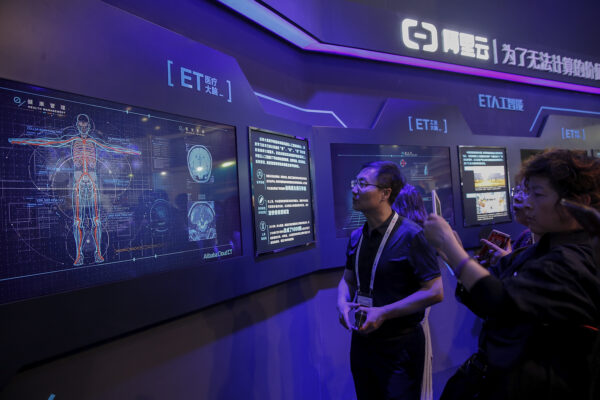China’s communist regime will establish a national data bureau to police and manage data resources, according to a plan submitted by the regime’s State Council to the rubber-stamp National People’s Congress during the ongoing Chinese Communist Party’s (CCP’s) top Two Sessions meeting on March 7.
Observers believe that the CCP’s surveillance of China’s people is likely to intensify in the future, and that the move will serve to centralize resources for the regime’s tech war with the United States.
According to an official notice issued by the CCP, the new data bureau will coordinate the integration, sharing, development, and utilization of data resources, and promote the planning and construction of the digital economy and digital society.
The new national bureau will be managed by the regime’s National Development and Reform Commission, integrating the separate functions of the Cyberspace Administration of China and parts of the National Development and Reform Commission.

Currently, China’s data resources are managed by several agencies separately, including the Cyberspace Administration of China, the Ministry of Industry and Information Technology, and the Development and Reform Commission. In the future, all data-related issues and resources will be managed by a single agency—the new national data bureau.
All Data Under a Single Agency
The Chinese regime says the new office will formulate strategic policies and orchestrate nationwide initiatives in economic development and social control, and better coordinate efforts in its competition with the West in cutting-edge technology, such as AI and semiconductors—thus reducing reliance on American technology.
The planned data bureau will have the power to rule on whether multinational companies can export data generated by their operations in China. It will also set rules for corporate data collection and sharing, such as restricting companies from collecting certain kinds of consumer data, or screening the data that Chinese companies plan to share with their foreign business partners for potential national security breaches.
Regarding the establishment of a Chinese data bureau that would centralize regulatory power and digital resources, Li Linyi, a New York-based current affairs commentator, told The Epoch Times that he is worried the CCP’s surveillance of the Chinese people is likely to intensify in the future.
“In the past, the CCP’s monitoring of data was fragmented, and only local governments could control it,” Li said. “Now it is coordinated by the central agency, which is equivalent to the central government’s control.”
Li said that many of the CCP’s actions are lawless, including how it processes and uses data that the public has been denied the right to know. Moreover, the CCP never abides by its own rules and laws, he said.
Sun Tianshu, a professor at the University of Southern California, has had in-depth exchanges and cooperation with China’s top technology companies and Chinese government departments in the past. In a recent article, Sun revealed that Chinese technology giants Alibaba and Tencent have already directly handed over the data of users—i.e., private individuals—in full to the CCP.
He said the CCP regards digitalization as “a sharp-edged sword handed to the CCP by technological progress … It’s ready to sharpen the knife and shove it into the people at any time.”
Chinese netizens are also discussing the establishment of the data bureau on Twitter. One netizen commented that the new data agency “is not a simplification of institutions, but a centralization of power.”
Lin Yan contributed to this report.

